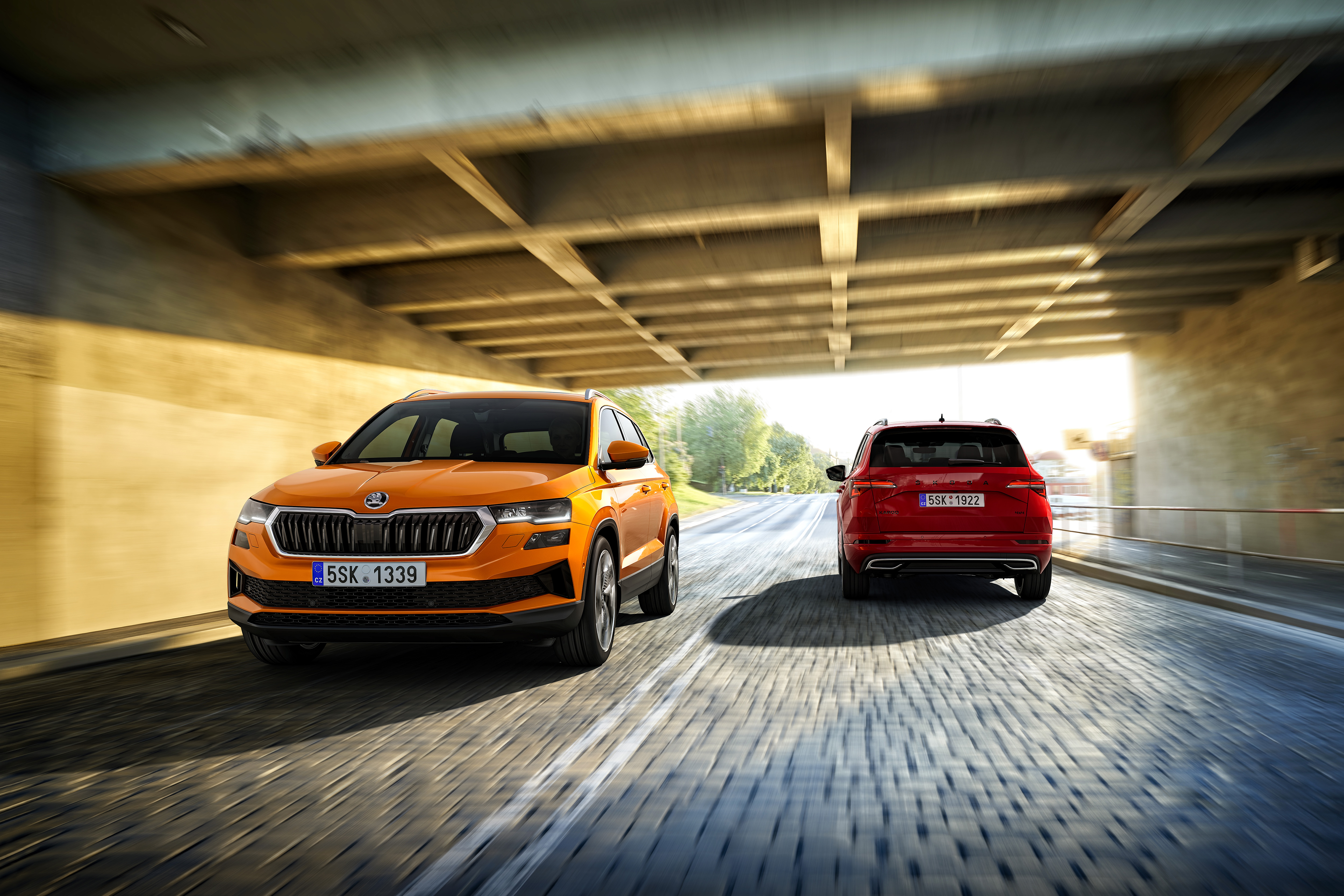› Five advanced engines delivering 81 kW (110 PS) to 140 kW (190 PS) output
› All-wheel drive as standard for the most powerful petrol engine and optional for the range topping diesel
› Choice of 6-speed manual or 7-speed DSG for three engines
Mladá Boleslav, 30 November 2021 – The revised ŠKODA KAROQ comes with a choice of five advanced and efficient EVO-generation engines from Volkswagen Group, which deliver an output from 81 kW (110 PS) to 140 kW (190 PS). With an injection pressure of up to 350 bar, the three TSI petrol engines are particularly efficient. The nitrogen oxides (Nox) emitted by the two diesels are significantly below the standards stipulated thanks to the ‘twin dosing’ exhaust gas treatment. ŠKODA offers the 2.0 TSI engine with an output of 140 kW (190 PS) exclusively in the KAROQ SPORTLINE in combination with 7-speed DSG and all-wheel drive. For the more powerful diesel, 4×4 and 7-speed DSG are available as options.
“The current generation of our modern EVO engines have allowed us to make our cars more efficient while reducing their CO2 and NOx emissions. For the diesels, we apply a particularly effective ‘twin dosing’ exhaust gas treatment and for the petrol engines, we reduce fuel consumption by using high injection pressures, among other things. The current engines now develop their power much more harmoniously.”
Johannes Neft, ŠKODA AUTO Board Member for Technical Development
ŠKODA KAROQ engines at a glance:
| Engine | Cylinders | Max. power output | Transmission | Max. torque
[Nm]* |
|
| [kW] | [PS] | ||||
| 1.0 TSI EVO | 3 | 81 | 110 | 6-speed M | 200 |
| 1.5 TSI EVO | 4 | 110 | 150 | 6‑speed M | 250 |
| 7-speed DSG | |||||
| 2.0 TSI EVO | 4 | 140 | 190 | 7-speed DSG 4×4 | 320 |
| 2.0 TDI EVO | 4 | 85 | 116 | 6‑speed M | 300 |
| 7-speed DSG | 250 | ||||
| 2.0 TDI EVO | 4 | 110 | 150 | 6-speed M | 340 |
| 7-speed DSG 4×4 | 360 | ||||
*preliminary data
Highly efficient EVO engines and reduced emissions
ŠKODA AUTO has integrated a number of technical measures to make the current EVO-generation engines even more efficient and reduce their emissions. For the diesels, weight-optimised crankshafts and extensive modifications to the exhaust gas routing – as well as the turbo, injection and thermo-management systems – result in lower fuel consumption. In addition, the TDIs are equipped with a further developed SCR exhaust gas treatment system and two catalytic converters. Using what is known as ‘twin dosing’, AdBlue® is injected in front of the two SCR catalytic converters that are positioned one after the other, reducing nitrogen oxide (NOx) emissions to far below the required standards. As a result, the EVO-generation TSI petrol engines are more efficient than their predecessors. An injection pressure of up to 350 bar ensures lower hydraulic losses and a reduced fuel delivery rate. In the 1.0 TSI and 1.5 TSI engines, an innovative powder-coated layer measuring just 150 μm (0.15 mm) replaces cast-iron cylinder liners. This reduces internal friction, which lowers fuel consumption and emissions. Through better distribution and dissipation of heat in the combustion chamber, it also lowers the thermal load on the engine. Equipped with Active Cylinder Technology (ACT), the 1.5 TSI automatically shuts down two cylinders when engine load is low, thereby further reducing fuel consumption.

Christian Heubner
Head of Product Communications
T +420 730 862 420
christian.heubner@skoda-auto.cz
Zdeněk Štěpánek
Spokesperson – Product Communications
T +420 730 861 579
zdenek.stepanek3@skoda-auto.cz















